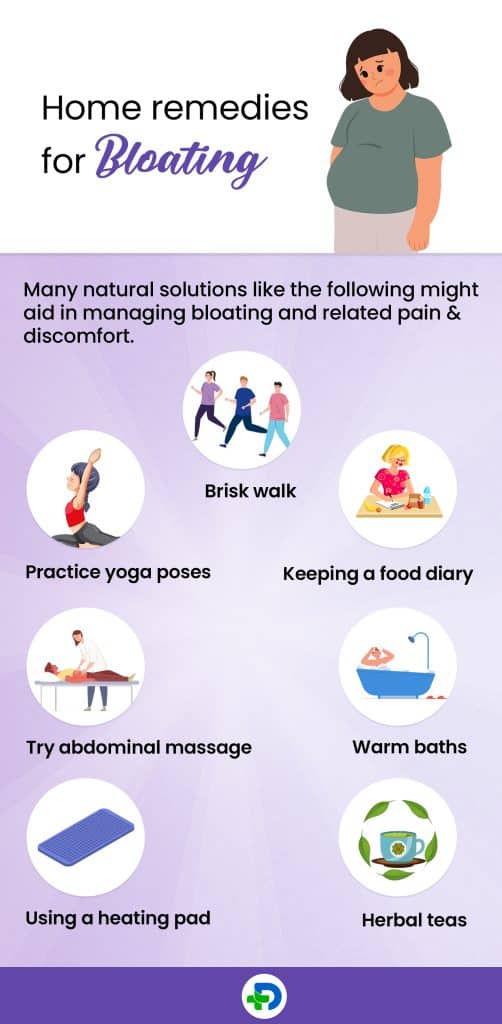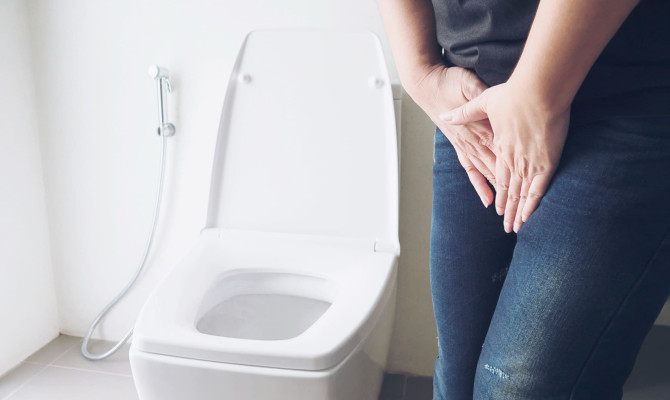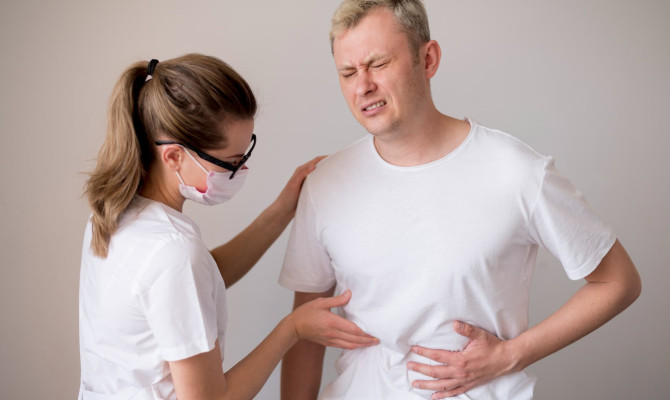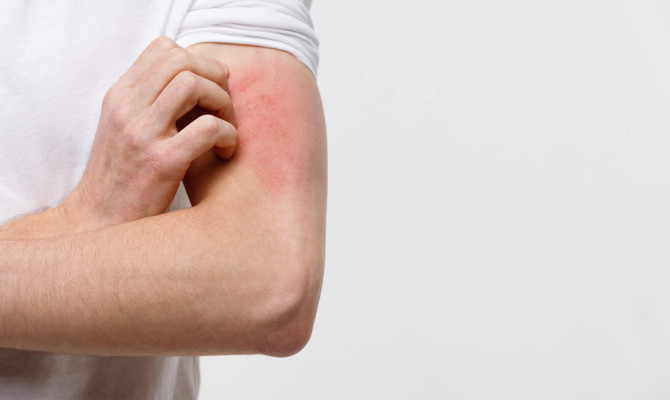Bloating – Reasons and Management

- Bloating
- 14 Aug 2023
Overview
What is abdominal bloating?
Abdominal bloating is a very common condition, where a person’s tummy feels heavy, full, and uncomfortable with a feeling of too much gas in the abdomen. 1What is abdominal bloating | Researched based study from Nlm.nih.gov Bloating is a frequent condition that can be relieved in both adults and children. It is widely observed by men and women of all ages, with women being the most commonly affected. 2What is abdominal bloating | Researched based study from Nlm.nih.gov Bloating may make it difficult for individuals to work or engage in cultural or social activities. Bloating symptoms are experienced by more than 90% of Irritable Bowel Syndrome (IBS) sufferers.

Symptoms
Symptoms of bloating
Symptoms can include the following:
- A fuller-than-normal feeling in the stomach.
- The feeling of gas in the abdomen.
- Excessive farting and burping.
- Pain or discomfort in the abdomen.
- The abdomen makes rumbles or additional noises.
Reasons
Reasons of bloating
There could be a variety of reasons for bloating and they may include the following:
- Swallowing excess air – while chewing gum, consuming food or beverages too quickly, smoking, etc.
- Delayed stomach emptying – delayed gas transport and accumulation of gas may result in bloating.
- Dietary factors – like gluten sensitivity, lactose intolerance, or other food intolerance.
- Digestive issues – like celiac disease, irritable bowel syndrome, intestinal bacterial overgrowth 3Reasons of bloating | Researched based study from Nlm.nih.gov visceral hypersensitivity, altered gut motility, chronic constipation, etc.
- Stomach or intestinal inflammation – is caused by bacterial infection, namely, Helicobacter pylori, or by consuming too much alcohol.
- Eating disorders – anorexia and bulimia.
- Gastric outlet obstruction – may be partial or total depending on whether the gastrointestinal tract is mechanically obstructed by a tumor or not moving properly. 4Reasons of bloating | Researched based study from Nlm.nih.gov
- Hormonal factor – related to water retention and hormonal changes, particularly in women before and throughout their periods. 5Reasons of bloating | Researched based study from Nlm.nih.gov Also common in women in their perimenopause.
- Intestinal parasitic infestation – example: giardiasis.
- Visceral hypersensitivity – even a small change in the diet may cause reactions.
- Mental health disorders – like anxiety, stress, sleeplessness, etc.
- Increase in abdominal fluid (ascites) – may be seen in kidney failure, or heart failure or liver disease.
- Pancreatic insufficiency – a lack of digestive enzymes produced by the pancreas, leading to compromised digestion.
- Perforation of the GI tract – allowing gas, common GI bacteria, and other substances to escape and enter the abdominal cavity.
- Cancer – ovarian cancer, cancer of the intestine, pancreatic cancer, or stomach cancer, etc. may result in bloating.
Prevention
How to prevent bloating ?
One may reduce or prevent bloating by practicing the following:
- Increase water intake to help in the easy movement of digested materials in the intestine. Also prevents stool hardening.
- Exercise frequently to enhance digestion and motility.
- Avoid eating anything that is not tolerated.
- Eat more fiber-rich foods to avoid constipation.
- Replace big meals with smaller, more regular ones.
- Refrain from consuming heavy meals, especially just before bed.
- Steer clear of sodas, alcohol, caffeine, etc.
- Cut back on salt consumption. 6How to prevent bloating | Researched based study from Nlm.nih.gov
- Avoid smoking as the person smoking may also swallow air as he inhales the smoke.
- Stay away from processed foods that are greasy, sweet, or hot.
- To prevent swallowing too much air, chew meals thoroughly and slowly with your mouth closed, and do not chew gums.
Emergency
When to seek medical help?
Bloating can be a symptom of several dangerous conditions, therefore anyone who has any of the symptoms listed below should get medical attention right away:
- Pain in the abdomen.
- Worsening heartburn.
- Diarrhea.
- Vomiting.
- Weight loss.
- Unable to poop.
- Persistent constipation.
- Black, tarry-looking stools.
- Blood in the stool.
Management
Management of bloating
Often, there is no need for treatment for bloating; but, if the need arises, the following options may be considered depending on the underlying cause:
- Dietary adjustments.
- Over-the-counter medications
- Medications on prescription.
- Home remedies.
Dietary adjustments
- A low-FODMAP diet – It minimizes a few carbohydrates that are challenging for some to digest. 7Management of bloating | Researched based study from Nlm.nih.gov
- Include probiotics in daily diet as it might aid in the repopulation of beneficial gut flora. For example Greek yogurt, curd, etc. 8Management of bloating| Researched based study from Nlm.nih.gov
- Include a good amount of fiber in your diet.
- Reduce gluten and carbs to a minimum.
- Keep away from carbonated beverages, and processed food with excessive amounts of salt or sugar.
- Steer clear of foods like cabbage, beans, and lentils that make you bloated.
- Avoid using a straw when drinking, and eat slowly.
- Recognize dietary intolerances and steer clear of them.
- Eat a diet low in sodium.
Over-the-counter medications
Medications may be prescribed to ease or to treat the underlying cause of bloating and a few of them are mentioned below:
- Anti-foaming agents/ Gas-releasers – simethicone to release trapped gas. 10Management of bloating | Researched based study from Nlm.nih.gov
- Laxatives – to relieve constipation.
- Antibacterial agent – Bismuth salicylate (Pepto-Bismol) 11Management of bloating | Researched based study from Nlm.nih.gov
- Supplements that aid in the breakdown of problematic proteins or carbohydrates (Beano, Lactaid)
- Antacids to prevent excess stomach acid or heartburn.
- A rectal suppository or an enema to relieve bloating.
Medication on prescription
- Antispasmodics – can ease bloating by calming the smooth muscles. 12Management of bloating | Researched based study from Nlm.nih.gov
- Osmotic laxatives – polyethylene glycol solution.
- Antibiotics – may be given in situations of IBS or abdominal bacterial overgrowth. Example – Rifaximin.
- Prokinetics – may hasten digestion and lessen bloating. Example – Cisapride, domperidone, etc.
- Antidepressants – like citalopram (Celexa) might aid with bloating reduction.
- Chloride channel activators may help treat bloating.
Remedies

Home remedies
Many natural solutions like the following might aid in managing bloating and related pain and discomfort.
- Brisk walk or exercise – Exercise can assist with the bowels flow and aid in the elimination of excess gas and stool. example – Squats, or brisk walks.
- Practice yoga poses – Can put the abdominal muscles in a position that promotes the GI tract’s discharge of extra gas. People can swiftly release a buildup of gas by performing yoga. for example – Child’s Pose, Happy BAby pose, etc. 9Home remedies | Researched based study from Nlm.nih.gov
- Keeping a food diary – Maintaining a food journal to track bloating is beneficial as it helps identify food intolerances and implement healthy lifestyle adjustments.
- Try abdominal massage – It is extremely beneficial to massage the abdomen in the area of the large intestine tract. To remove any trapped wind, rub your tummy from right to left.
- Warm baths – are a great way to relax and might help an aching stomach. It can also lower stress levels, which might enhance digestion and reduce bloating.
- Using a heating pad – to ease pain or discomfort.
- Herbal teas – Teas with chamomile, ginger, peppermint, turmeric, or fennel can ease bloating and promote digestion.
Takeaway
Takeaway
The true cause of bloating influences the prognosis. Abdominal bloating can be caused by a variety of straightforward conditions, including gases, constipation, indigestion, intolerance to foods, and retention of fluids. It can cause discomfort and pain. Home Solutions, lifestyle modifications, over-the-counter drugs, and prescription drugs can all be used to address these symptoms. Most people’s causes are straightforward and may be handled at home. If the symptoms become more severe or persist for more than a few days, a person should consult a doctor.
Any feedback on this article?
 This Articles content was accurate
This Articles content was accurate Very Informative Article
Very Informative Article I have a question or a comment
I have a question or a comment
 This article contains inaccurate content
This article contains inaccurate content This article was not helpful
This article was not helpful I have a question or a comment
I have a question or a comment
We appreciate your helpful feedback!
Checkout our social pages
References
-
National Library of Medicine
Abdominal bloating: pathophysiology and treatment | Overview
-
National Library of Medicine
Pathophysiology, Evaluation, and Treatment of Bloating | Overview
-
National Library of Medicine
Small Intestinal Bacterial Overgrowth | Causes
-
National Library of Medicine
Gastric Outlet Obstruction | Causes
-
National Library of Medicine
Gastrointestinal symptoms before and during menses in healthy women | Causes
-
National Library of Medicine
Effects of the DASH Diet and Sodium Intake on Bloating: Results From the DASH–Sodium Trial | Prevention
-
National Library of Medicine
Restriction of FODMAP in the management of bloating in irritable bowel syndrome | Treatment
-
National Library of Medicine
Management Strategies for Abdominal Bloating and Distension | Treatment
-
National Library of Medicine
Irritable Bowel Syndrome: Yoga as Remedial Therapy | Treatment
-
National Library of Medicine
Simethicone | Treatment
-
National Library of Medicine
Therapeutic Effects of Low-dose Bismuth Subcitrate on Symptoms and Health-related Quality of Life in Adult Patients with Irritable Bowel Syndrome: A Clinical Trial | Treatment
-
National Library of Medicine
Role of antispasmodics in the treatment of irritable bowel syndrome






































